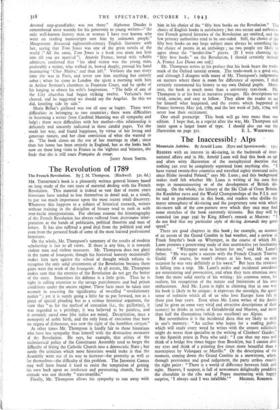The Revolution of 1789
The French Revolution. By J. M. Thompson. (Blackwell. 32.s. 6d.)
MR. THOMPSON'S book is a pleasantly written general history based on long study of the vast mass of material dealing with the French
Revolution. This material is indeed so vast that of recent years historians have tended to lose themselves in detail and, as a result, to put too much importance upon the most recent small discovery.
Whenever this happens to a subject of historical research, writers without training in the discipline of history tend to rush in with over-facile interpretations. For obvious reasons the historiography
of the French Revolution has always suffered from doctrinaire inter- pretation at the hands of politicians, political theorists and men of letters. It has also suffered a good deal from the political zeal and even from the personal feuds of some of the most learned professional historians.
On the whole, Mr. Thompson's summary of the results of modern scholarship is fair to, all views. If- there is any bias, it is towards violent men and violent measures. Mr. Thompson does not glory in the name of bourgeois, though his historical honesty occasionally makes him turn against the school of thought which refuses to recognise the only solid attainments of the Revolution because these gains were the work of the bourgeois. At all events, Mr. Thompson makes sure that the enemies of the Revolution do not get the better of the story. Sometimes his defence is a little grim. Thus he is right in calling attention to the savage punishments and bad prison conditions under the ancien regime. These facts must be taken into account in assessing the significance of so-called "revolutionary justice " ; yet it is surely going a little far to put forward, not as a piece of special pleading but as a serious historical argument, the view that "as for the method of execution (i.e., the guillotine), it was regarded as a privilege, it was believed to be painless, and it certainly saved time [the italics are mine]. Decapitation, c3nee a monopoly of noble birth, and the only form of execution that bore no stigma of dishonour, was now the right of the humblest citoyen."
At other times Mr. Thompson is hardly fair to those historians who have less sympathy than himself with the destructive measures A the Revolution. He says, for example, that critics of the ecclesiastical policy of the Constituent Assembly tend to forget the difficulty of fitting the Catholic Church into a democratic State ; but surely the criticism which most historians would make is that the Assembly went out of its way to increase—for posterity as well as for themselves—the difficulty of this problem. The Jansenist Camus may well have found it hard to resist the temptation of getting his own back upon an intolerant and persecuting church, but his attitude was not thereby "statesmanlike."
Finally, Mr. Thompson allows his sympathy to run away with
him in his choice of the "fifty best books on the Revolution." The choice of English books is satisfactory ; but two recent and authorita- " tive French general histories of the Revolution are omitted, and the few primary authorities tend to be one-sided. Still, the choice of the fifty best books on any large subject must always be something like the choice of poems in an anthology ; no two people are likely to agree about the " border-line " pieces. (If I were choosing the "fifty best books" on the Revolution, I should certainly include A. France Les Dieux ont soif.) Mr. Thompson writes in his preface that his book bears the trade- mark of the Oxford tutorial system. The trade-mark is a good one, and although I disagree with many of Mr. Thompson's judgements on matters where there is room for difference of opinion, r shall certainly recommend his history to my own Oxforii pupils. More- over, the book is much more than a university text-book. Mr.
• Thompson is at his best in narrative passages. His descriptions tare vivid, concise, and easy to follow. They allow the reader to see for himself what happened, and the events which happened in France between May 3rd, 1789, and the last week of July, 1794, will never lose their excitement.
One small postscript. This book will go into more than one edition. I hope that, in a reprint after the war, Mr. Thompson will insist upon a larger fount of type. I should also cut out the


























 Previous page
Previous page